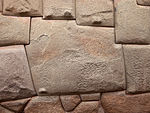
A sipapu (a Hopi word) was a small hole or indentation in the floor of a kiva (pithouse). Kivas were used by the Ancestral Puebloans and continue to be used by modern-day Puebloans. The sipapu symbolizes the portal through which their ancient ancestors first emerged to enter the present world.
Hopi mythology (and similar traditions in other Pueblo cultures such as the Zuni and Acoma) states that this is the hole from which the first peoples of this world entered. As they stepped outside of the sipapu, they changed from lizard-like beings into human form. It is from this point that the "First Peoples" of the Earth began to divide and separate, becoming tribes. The original sipapu is said in Hopi and some other Uto-Aztecan Puebloan mythology to be located in the Grand Canyon.
References
Citations
- Wenger 1991, p. .
- Waters 1963, p. .
- Courlander 1971, p. .
Works cited
- Courlander, H. (1971). The Fourth World of the Hopis. Albuquerque: University of New Mexico Press.
- Waters, Frank (1963). Book of the Hopis. New York: Penguin Group.
- Wenger, Gilbert R. (1991) . The Story of Mesa Verde National Park. Mesa Verde National Park, Colorado: Mesa Verde Museum Association. ISBN 0-937062-15-4.
Further reading
- Sando, Joe S. (1982). The Pueblo Indians. San Francisco: Indian Historian Press.
| Native American architecture | ||
|---|---|---|
| Styles |  | |
| Building types | ||
| Structures | ||
| Elements | ||
This article about history of religion is a stub. You can help Misplaced Pages by expanding it. |
This article relating to the Indigenous peoples of North America is a stub. You can help Misplaced Pages by expanding it. |